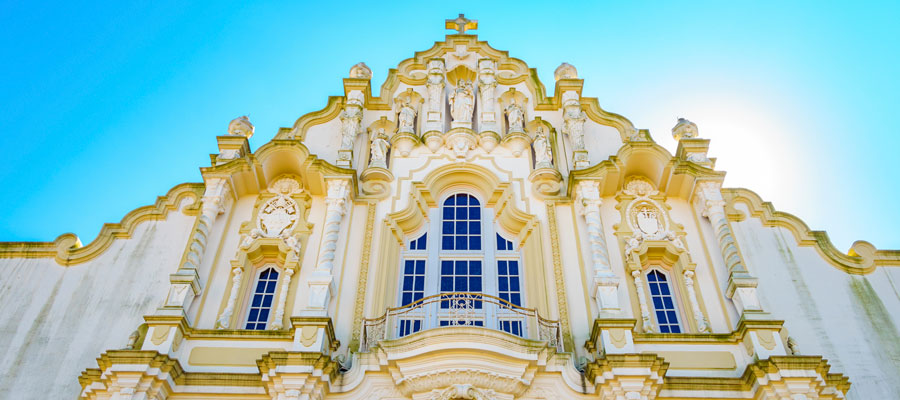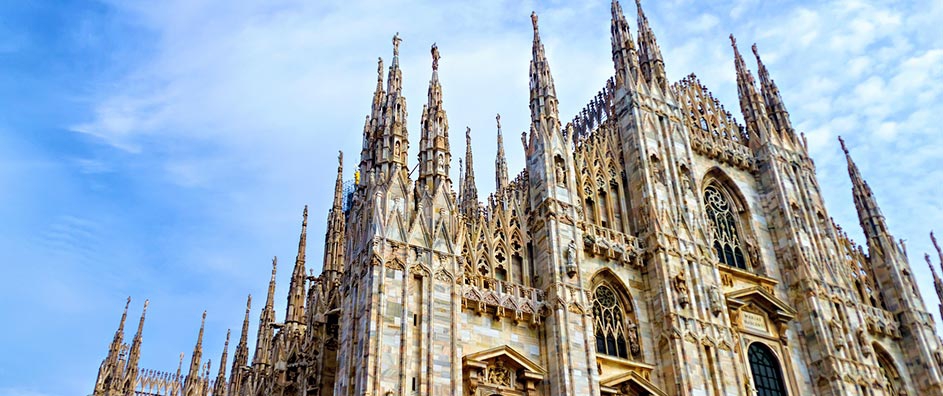The views expressed in our content reflect individual perspectives and do not represent the authoritative views of the Baha'i Faith.
Know ye not that ye are the temple of God, and that the Spirit of God dwelleth in you? – 1 Corinthians 3:16.
Man is the temple of God… God has created man lofty and noble, made him a dominant factor in creation. He has specialized man with supreme bestowals, conferred upon him mind, perception, memory, abstraction and the powers of the senses. These gifts of God to man were intended to make him the manifestation of divine virtues, a radiant light in the world of creation, a source of life and the agency of constructiveness in the infinite fields of existence. – Abdu’l-Baha, The Promulgation of Universal Peace, p. 352.
One of my earliest memories, probably from sometime in my third year on Earth, came when my mother and my younger brother and I drove past a very ornate and imposing old church.
“Is that where God lives?” I asked her.
I can still see that church in my mind’s eye today—stately, regal and impressive, it actually looked like a holy residence, with its sweeping arches, flying buttresses, tall spires and stained glass windows.
“God lives,” my lapsed Catholic mother said seriously, “in your heart, not in any building.”

With that answer in mind, why do humans continue building houses of worship? We’ve constructed shrines and temples and churches and mosques and synagogues forever. We’ve expended enormous sums, not just in money and treasure but in human labor and energy and time, to erect our houses of worship. Every town and village of any size has several. Our great cities have hundreds. What compels us to continue building more houses of worship?
The Baha’i teachings have a unique answer to this important question—that we build houses of worship as profound symbols of the Word of God, that “divine uniting force:”
Among the institutes of the Holy Books is that of the foundation of places of worship. That is to say, an edifice or temple is to be built in order that humanity might find a place of meeting, and this is to be conducive to unity and fellowship among them. The real temple is the very Word of God; for to it all humanity must turn, and it is the center of unity for all mankind. It is the collective center, the cause of accord and communion of hearts, the sign of the solidarity of the human race, the source of eternal life. Temples are the symbols of the divine uniting force so that when the people gather there in the House of God they may recall the fact that the law has been revealed for them and that the law is to unite them. They will realize that just as this temple was founded for the unification of mankind, the law preceding and creating it came forth in the manifest Word. – Abdu’l-Baha, The Promulgation of Universal Peace, p. 65.
Where do we come together in unity in modern society? The mall? The cineplex? The megachurch? The stadium? The concert hall?
All of those institutions offer us places to gather in large numbers, but none of them offer us ways to unify and truly connect with one another. When we shop or entertain ourselves, we’re in the presence of many other people, but not as a unified group. When we go to any particular church, we sometimes exclude those of other faiths. When we attend a sporting event or a concert or a film or a play, we might root for one team or see a particular kind of entertainment, but they all tend to have only a temporary unifying effect. None of the public spaces in modern life actually champion and advance the cause of oneness. Maybe that explains why so many people in today’s societies feel lost, abandoned and alienated.
To truly achieve oneness with each other, we need a central place to come together in unity.
That central place needs to welcome all people. It needs to be big enough, physically and spiritually, to accommodate everyone—not as a luxury, but as a necessity, because the spiritual part of human life has such a big role to play in our individual and collective well-being. Just as large hospitals serve as places of healing, we need centers for the promotion of our spiritual health. Dynamic and not static, filled with life and joy, a house of worship needs to occupy a central place in our cities and in our hearts.
That’s why Baha’is continue to build houses of worship that welcome and serve everyone—so they can serve as gathering places that allow us all, regardless of what we believe, to “enter under the tent of the Word of God:”
Do you know in what day you are living? Do you realize in what dispensation you exist? Have you not read in the holy scriptures that at the consummation of the ages there would dawn a day — the sum total of all past days? This is the day when the Lord of hosts hath come on the clouds of glory. This is the day in which the inhabitants of the world shall enter under the tent of the word of God. This is the day whose real sovereign is His Highness the Almighty. This is the day when the east and the west shall embrace each other like unto two lovers; war and contention shall be forgotten and nations and governments shall enter into an eternal bond of amity and conciliation. This century is the fulfillment of the promised century, the dawn of the appearances of the glorious visions of past prophets and sages.
Now is the early dawn; ere long the effulgent sun shall rise and station itself in the meridian of its majesty. Then ye shall observe the effects — then ye shall behold what heavenly illumination has become manifest — then ye shall comprehend that these are the infinite bestowals of God — then ye shall realize that this world has become another world and ye shall perceive the divine instructions, universally spread.
The teachings of His Holiness Baha’u’llah, like unto the spirit, shall penetrate the dead body of the world and like unto an artery shall beat through the heart of the five continents. – Abdu’l-Baha, Divine Philosophy, pp. 37-38.
Next: Tapping the Source of the Water of Life
You May Also Like
Comments

















"This is the Day that shall not be followed by night," as unbelievable (physically) as that seems, is, can be, will be, indeed true in all its manifold aspects. And we live in this Century of Light where it is unfolding rapidly daily in front of our eyes and behind our heads! ...
Thanks for this reminder David...